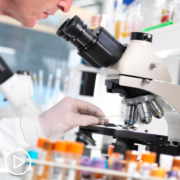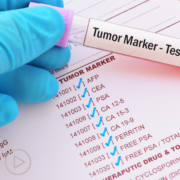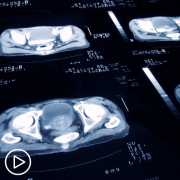Metastatic Prostate Cancer Treatment Sequencing: Emerging Research
Metastatic Prostate Cancer Treatment Sequencing: Emerging Research from Patient Empowerment Network on Vimeo.
What do metastatic prostate cancer patients need to know about developing treatment sequencing research? Dr. David Wise shares research updates about combination treatments and timing of treatments that have shown encouraging results.
Dr. David Wise is Director of Genitourinary Medical Oncology at the Laura and Isaac Perlmutter Cancer Center at NYU Langone Health. Learn more about Dr. Wise.
See More From INSIST! Prostate Cancer
Related Resources

|

Expert Perspective on the Future of Prostate Cancer Treatment and Research |

Why Prostate Cancer Patients Should Consider Participating in a Clinical Trial |
Transcript:
Katherine:
Dr. Wise, is there developing research or treatment news that prostate cancer patients should know about?
Dr. David Wise:
Yeah. I think in terms of other research, I think where we’re seeing a lot of excitement is in boosting the treatment at the time of initial diagnosis for men with metastatic prostate cancer, right?
So, what we’ve found is that for prostate cancer – and this has been true for some other cancers, but not all – it seem that when we use our best treatments early, we get a greater and greater return. We get a greater and greater durability of our effect and a more prolonged benefit of treatment effectiveness, of quality-of-life preservation, and a life span. That has really been, I would say, one of the key take-home points from the last five years.
And so, what’s exciting in the field is that we’re continuing to go in that direction. So, for example, there are clinical trials now testing some of the new CDK4/6 inhibitors like abemaciclib or Verzenio, which is a clinical trial that we have here for men who are initially diagnosed.
There are clinical trials testing lutetium PSMA 617 at the time of the initial diagnosis rather than waiting until treatment resistance develops. I think it’s a principle that’s emerged. I don’t know that I would call it a law. If it were, we wouldn’t have to do clinical trials, and that’s because with more exposure to these treatments, there is potential for more cumulative side effects with more combinations of treatments. There’s more potential for additive side effects that can occur from that combination.
So, we need to see and really prove to ourselves that treating earlier is better than treating in a one-treatment-at-a-time sequential approach. But I think that the lesson from many other cancers has really been that combination treatments have been the most effective treatments. And I think that now that we have additional effective treatments that have been approved as a standalone strategy.
What’s exciting now is that we’re now seeing the combination of these strategies into one, two, three, four drug regimens. And can we cure? And that’s, of course, what we’re really hoping for. That’s what we’re all striving for in oncology. So, that’s, I think, were a lot of the excitement is in oncology right now.
What Questions Should Prostate Cancer Patients Ask About Testing and Test Results?
What Questions Should Prostate Cancer Patients Ask About Testing and Test Results? from Patient Empowerment Network on Vimeo.
What are key questions for prostate cancer patients to ask about testing and test results? Dr. David Wise explains the concept of shared decision-making and advice for taking to your doctor about test results to help access quality care.
Dr. David Wise is Director of Genitourinary Medical Oncology at the Laura and Isaac Perlmutter Cancer Center at NYU Langone Health. Learn more about Dr. Wise.
See More From INSIST! Prostate Cancer
Related Resources

|

Prostate Cancer Testing: What Tests Should You Advocate For? |

How Do Biomarker Test Results Impact a Prostate Cancer Patient’s Prognosis? |
Transcript:
Dr. David Wise:
It’s a good question. I think patients, first of all, should really understand that although the oncologist often has a lot of information and often a lot of experience, the patient is the one that really should have the power to make the decisions.
And the patient should often remind the oncologist of that, that shared decision-making is a crucial empowerment concept that patients need to understand.
Patients come into a treatment in an incredibly vulnerable position, and that’s for a few different factors. And I think that they need to understand that they need to express their preferences, and they need to actively take part in that decision. And I think expressing that is really important. I think oncologists should also help patients understand that, that they’re the ones in the driver’s seat, that they’re the ones that have the power to make the decision, and that the position should be arrived at in a shared decision framework.
In terms of questions patients should ask, patients should always ask about alternative. I think oftentimes, you hear maybe just treatment option that oncologist thinks might be the best, but I think it’s important to constantly say, “Well, what are the alternative here? Is there anything else that we could think about?” Perhaps that treatment that you’re suggesting sounds really exciting, but it really may not work for me for my particular context.
So, is there another option that the oncologist may not be thinking about because it wouldn’t be their usual recommendation. But maybe in my specific circumstance, there might be something that would work better for me. I think those are the kinds of questions, continuing to voice your preferences, what you want.
Finding the right treatment is so critical. And arriving at it from a shared decision-making, it just continues to build that relationship, and it makes for a much better dynamic over the course of that treatment and others.
Are We Getting Closer to Precision Oncology for Prostate Cancer?
Are We Getting Closer to Precision Oncology for Prostate Cancer? from Patient Empowerment Network on Vimeo.
Is there progress in precision oncology for prostate cancer? Dr. David Wise shares his perspective about precision oncology and an update about ongoing research.
Dr. David Wise is Director of Genitourinary Medical Oncology at the Laura and Isaac Perlmutter Cancer Center at NYU Langone Health. Learn more about Dr. Wise.
See More From INSIST! Prostate Cancer
Related Resources

|

How Do Biomarker Test Results Impact Prostate Cancer Treatment Options? |

|
Transcript:
Dr. David Wise:
Sure. So, yes. One of the key steps going forward for our research is to look for more of these precision targets that we can take advantage of. We certainly think that there are more genetic features out there that have yet to be treated effectively. And so, those are the kinds of treatments that we’re really excited about.
And so, along those lines, we have clinical trials here that are looking at specific mutations in the androgen receptor gene, for example, which is a clear gene that promotes the development of prostate cancer and its resistance to established treatments. So, we have clinical trials here targeting the androgen receptor, particularly when it’s mutated, okay? So, that’s one example. We have immunotherapy trials here that are really looking to target PSMA, so with the same sort of precision target.
But instead of looking for a different target, we’re trying to treat the same target but with a different treatment modality. So, instead of using radiation targeted towards that PSMA, we’re trying to use antibodies that bring the immune system towards that target in order to provide a potentially better tolerated and longer-lasting treatment to patients with PSMA on their cancer.
And even taking it to the next step, what we’ve found is that…how do we help boost the long-term durability of our treatments? A lot of these precision treatments give us an initial excellent result only to eventually stop working. And so, how do we extend durability? That’s a very important area of research. And we think part of that is boosting the immune system’s response to the treatment. And so, we’re actually also going to begin a trial in the next few months, which we think is really exciting, where we’re combining lutetium PSMA to target those PSMA-expressing prostate cancers.
But then we’re combining that with a type of immunotherapy that we think will more fully expose the cancer to the treatment effect and remove some of the barriers in the body towards fully killing those remaining cancer cells.
Prostate Cancer Treatment: What Is Precision Oncology?
Prostate Cancer Treatment: What Is Precision Oncology? from Patient Empowerment Network on Vimeo.
How is precision oncology used in prostate cancer? Dr. David Wise defines precision oncology and explains how it is used in conjunction with prostate cancer testing for patient care.
Dr. David Wise is Director of Genitourinary Medical Oncology at the Laura and Isaac Perlmutter Cancer Center at NYU Langone Health. Learn more about Dr. Wise.
See More From INSIST! Prostate Cancer
Related Resources

|

|

Are We Getting Closer to Precision Oncology for Prostate Cancer |
Transcript:
Dr. David Wise:
Absolutely. So, precision oncology is really a term that describes being able to tailor treatment to a patient’s cancer to the information that we have from that specific individual. So, it’s really tailored medicine. And it’s precise because, typically, that treatment is leveraging or exploiting a specific vulnerability or feature that we’re able to discern by a specialized testing of that patient’s cancer, okay?
And so, everything that I’ve been discussing, biomarker testing that lends itself directly to treatment is largely overlapping and very much an example of precision oncology. So, using genetic test results to guide treatment from that patient, that’s tailored to that patient. So, that is precision oncology.
Using that patient’s PSMA profile to determine the benefit of lutetium, that is, in my view, precision oncology. There are other examples of this in multiple different spheres and using multiple different treatment types, but that’s the general concept. I think the other example of precision oncology in general and specifically for prostate cancer are targeting NTRK mutations. So, NTRK I, II, and III, those are genes that can get mutated in any cancer type.
And just like the example of immunotherapy with microsatellite instability, the same holds true. So, any cancer with an NTRK mutation, there is an FDA approval to use NTRK inhibitory oral medications to treat that patient. Similarly to immunotherapy and microsatellite instability, we wish those mutations were more common because the treatment is very well-tolerated and is incredibly effective.
But still, just because it’s not common doesn’t mean we shouldn’t look for it because of how impactful these treatments can be.
How Do Biomarker Test Results Impact Prostate Cancer Treatment Options?
How Do Biomarker Test Results Impact Prostate Cancer Treatment Options? from Patient Empowerment Network on Vimeo.
What can biomarker test results indicate about prostate cancer treatment options? Dr. David Wise discusses genetic mutations, treatment classes, and testing methods that are commonly examined to help determine optimal prostate cancer approaches.
Dr. David Wise is Director of Genitourinary Medical Oncology at the Laura and Isaac Perlmutter Cancer Center at NYU Langone Health. Learn more about Dr. Wise.
See More From INSIST! Prostate Cancer
Related Resources

|

Prostate Cancer Testing: What Tests Should You Advocate For? |

How Do Biomarker Test Results Impact a Prostate Cancer Patient’s Prognosis? |
Transcript:
Dr. David Wise:
So, that’s a great question. So, there are multiple gene test results that can directly influence a choice of treatment. I think that it’s important to highlight two main categories, both within the genomic testing setting. Both of these test results have their major impact in patients with metastatic prostate cancer, whether the cancer has been treated already and is resistant to current treatments, or even some situations where the cancer has not even been treated.
For metastatic prostate cancer, I think it’s important to assess whether the cancer has evidence of a BRCA1 or 2 mutation, or whether the cancer has evidence of a genetic feature called microsatellite instability, or MSI high. Cancers that have evidence of BRCA1 or 2 have clear benefit. Patients have clear benefit from treatment that targets those genes. And that’s a class of oral medications called PARP inhibitors, several of which are already FDA-approved for hormone-resistant metastatic prostate cancer with evidence of BRCA1 or 2 mutation.
There are even newer clinical trials which are testing the use of those medicines at the outset of men who are initially diagnosed with metastatic prostate cancer, even naïve to treatment and testing whether we should be adding on PARP inhibitors for men with that genetic feature.
Microsatellite instability, as well, leads to a clear FDA indication for immunotherapy with what we call checkpoint inhibitors that target and reinvigorate the body’s immune system. We know that prostate cancers with that particular genetic feature, which unfortunately is still an uncommon type of prostate cancer – but when it happens, it’s important to know about it because those immunotherapies can have truly life-changing, truly very long lasting, in the order of years, benefit to keeping that cancer to an undetectable level. Now, I would say, those are the key genomic features that directly translate to changes in treatment.
There are other biomarkers, one we haven’t talked about which is very impactful, which is levels of PSMA expression on a PET scan. So, we talked about that in the setting of making a diagnosis, but it also is important for dictating best treatment. So, we now know, based on the results of a large Phase III trial that patients with prostate cancers that have PSMA uptake on PET imaging, which is an imaging biomarker, not a genetic biomarker, but an imaging biomarker.
Those patients respond quite well to lutetium PSMA, which is a radioligand therapy that targets PSMA-producing prostate cancers. And so, those are examples of, I think, very impactful biomarkers that patients need to know about, so that they can ask their physicians to get tested to see if they’re candidates for those potential treatments.
So, the genetic tests can be done either on biopsy material or on blood. And the latter has really been a major advance because we’ve been able to identify patients who are eligible without exposing them to an additional fresh biopsy. Sometimes, we need to because sometimes the blood does not have sufficient material to be able to establish the diagnosis. But still, it is often worth trying because, of course, we would try to do anything to avoid undergoing a risky procedure, and this is an example of that. In order to assess hereditary genetic risk, that can be done from a saliva sample. So, often, a cheek swab is enough, but testing for that is often pretty standard as well. So, that’s another option.
So, in order to assess PSMA expression, which lends itself directly to the use of lutetium PSMA, that’s the straightforward PET scan. It’s now something that is readily available at the vast majority of academic centers and in the community as well.
How Do Biomarker Test Results Impact a Prostate Cancer Patient’s Prognosis?
How Do Biomarker Test Results Impact a Prostate Cancer Patient’s Prognosis? from Patient Empowerment Network on Vimeo.
How can a prostate cancer patient’s prognosis be impacted by biomarker test results? Dr. David Wise shares insight about biomarkers that are important in determining higher risk prostate cancer.
Dr. David Wise is Director of Genitourinary Medical Oncology at the Laura and Isaac Perlmutter Cancer Center at NYU Langone Health. Learn more about Dr. Wise.
See More From INSIST! Prostate Cancer
Related Resources

|

Prostate Cancer Testing: What Tests Should You Advocate For? |

How Do Biomarker Test Results Impact Prostate Cancer Treatment Options? |
Transcript:
Dr. David Wise:
Great question. So, every biomarker needs to be considered independently.
And whether it adds additional prognostic information to the other variables that we’ve already collected. And so, there are a few different biomarkers that we can discuss. I think that perhaps the most well-known, and in some sense very important one, is the one I mentioned before, which is the abnormal BRCA2 gene test results.
So, patients who have that hereditary genetic mutation with BRCA2, we do have evidence that those cancers at diagnosis tend to have a higher Gleason score. They tend to be higher risk. Those cancers are still curable. Those cancers are still very treatable, but they tend to be less common in that low-risk category. So, we tend to be, at times, a bit more reluctant to manage patients with BRCA2 with surveillance alone, because their cancers typically need more intensive treatment.
Prostate Cancer: What’s the Difference Between Hereditary and Biomarker Testing?
Prostate Cancer: What’s the Difference Between Hereditary and Biomarker Testing? from Patient Empowerment Network on Vimeo.
What’s the difference between hereditary testing and biomarker testing? Dr. David Wise explains how biomarker testing and hereditary testing differ – and discusses the impact and potential risks of some mutations.
Dr. David Wise is Director of Genitourinary Medical Oncology at the Laura and Isaac Perlmutter Cancer Center at NYU Langone Health. Learn more about Dr. Wise.
See More From INSIST! Prostate Cancer
Related Resources

|

|

|
Transcript:
Dr. David Wise:
That’s a great question. So, hereditary genetic testing is a test that looks specifically to establish whether a person is born with a gene that predisposed them to develop that cancer, and therefore has two clear implications.
If the test result is abnormal, then the patient was born with that gene. Therefore, other family members, first-degree relatives, may also have that gene, and that may predispose those other family members to the same cancer or to other cancers. For example, BRCA2 can predispose to the prostate cancer that the patient that we’re discussing has, but it can also predispose to breast or ovarian cancer or pancreas cancer. And if the patient has an abnormal BRCA2 gene, then their first-degree relatives have a 50 percent chance of having that gene and being predisposed to cancer, not necessarily having a guaranteed development of that cancer, but having a higher risk of developing that cancer.
So, it has implications for family member testing or what we call cascade testing, but it also has potential implications depending on the gene. And we’re looking for, even if it’s a hereditary gene, it can still have implications for how to best treat or monitor that patient’s cancer. And so, that’s the hereditary genetic testing. Now, biomarker testing is a broader umbrella term, and it just refers to any information or test result that we collect that gives us information about how that patient is going to respond to treatment, which means a predictive result. So, it tells us potentially which treatment might work better or worse or what we call a general prognostic information.
So, information about that patient’s…the important things to what that person is worried about: How long they’re going to live, how well they’re going to respond to treatment, how aggressive their cancer is going to be. So, that’s biomarker testing. Now, what I think is particularly confusing – and maybe I’ll shed light on this – is: Well, what’s the difference between somatic genetic testing and hereditary genetic testing?
So, somatic genetic testing is actually testing that is focused purely on what genes were mutated in the prostate that promoted the development of that cancer. Abnormal test results on that test are not directly related to hereditary risk. Just because a patient’s cancer has mutated gene X does not mean that their family member has a predisposition to develop to having that gene. They’re completely unrelated. So, really, patients should have both types of genetic testing.
But there are specific criteria for which patient qualifies for which type of test, and that’s a detailed conversation that needs to happen between the physician and the patient.
Essential Testing Following a Prostate Cancer Diagnosis
Essential Testing Following a Prostate Cancer Diagnosis from Patient Empowerment Network on Vimeo.
What essential tests do prostate cancer patients need following a diagnosis? Dr. David Wise shares an overview of imaging, scans, and targeted testing to help guide an optimal care and treatment plan for each patient.
Dr. David Wise is Director of Genitourinary Medical Oncology at the Laura and Isaac Perlmutter Cancer Center at NYU Langone Health. Learn more about Dr. Wise.
See More From INSIST! Prostate Cancer
Related Resources

Prostate Cancer Testing: What Tests Should You Advocate For? |

What Do Prostate Cancer Patients Need to Know About Genetic Testing? |

Why Should You Ask Your Doctor About Prostate Cancer Genetic Testing? |
Transcript:
Dr. David Wise:
Sure. So, that’s a great question. The testing for prostate cancer really has advanced over the last decade. So, it’s very much standard, of course, for patients to have a biopsy to confirm evidence of prostate cancer. That biopsy will assess for the Gleason score, which gives us information about how abnormal those cells look under the microscope.
It remains the most important feature for understanding the risk of the cancer and how intensive the treatment needs to be to treat that cancer. Of course, the PSA at the time of diagnosis is also useful for that assessment of risk. And the MRI is the third key feature that we look at, the MRI of the prostate, that is, which is often done before biopsy and often guides the biopsy for the urologists to make sure that they’re sampling the most concerning nodule within the prostate. And that MRI gives us information about the extent of the cancer, whether there had been any spread of the cancer, and the overall size of the prostate cancer mass. Now, over the past few years, there’s been some changes.
So, patients with high risk or very high risk but nonmetastatic prostate cancer are often also imaged with something called PET scan, which is specific for prostate cancer looking at the levels of a protein called PSMA. And there are several brand names that will provide that imaging test through this PET imaging scan. That also gives us an even more accurate sense of the extent of the cancer, whether it has spread or not.
And I think what’s really important is also thinking about the genetics of the cancer. And so, for patients with high-risk early-stage prostate cancer or metastatic prostate cancer and for patients with a significant family history or with an Ashkenazi Jewish ancestry, we recommend hereditary genetic testing.
And that needs to be distinguished from testing of the tumor itself or testing of the DNA derived from the tumor, which is called somatic testing. And it is not a hereditary test, but it’s a test that actually gives us information about the genes that are mutated and promoted at the development of that cancer. And that somatic testing is important, but it’s really critical for men who have advanced prostate cancer, metastatic hormone-resistant prostate cancer, where we already have FDA-approved treatments that are tailored to the results of those gene test results.
So, those are really the standard tests that we think about. There are some emerging tests I think that some oncologists will recommend, and some won’t. The most prominent of those is the Decipher genomic score. So, that’s a test that also uses RNA or a type of genetic information from the cancer that can be used to assess the risk.
And in my experience, that gives sometimes complementary information and adds further, I would say, or sheds further light on the tests that we already have. And particularly for men with otherwise intermediate risk prostate cancer, sometimes, the Decipher test can give us some more clarity, but I don’t think it’s absolutely critical at this time to order that test. I think we usually get the information that we need from the test that we have.
Could Genetic Mutations Impact Your Prostate Cancer Treatment Options?
Could Genetic Mutations Impact Your Prostate Cancer Treatment Options? from Patient Empowerment Network on Vimeo.
Can prostate cancer treatment options be impacted by a patient’s genetic mutations? Expert Dr. Tomasz Beer defines precision oncology and explains how DNA repair and mutations can affect treatment options.
Dr. Tomasz Beer is Deputy Director at OHSU Knight Cancer Institute. Learn more here: https://www.ohsu.edu/people/tomasz-m-beer-md-facp.
See More From INSIST! Prostate Cancer
Related Resources

Why Should You Ask Your Doctor About Prostate Cancer Genetic Testing? |

|

Prostate Cancer Treatment Decisions: How Do Genetic Test Results Impact Your Options? |
Transcript:
Katherine:
Are there genetic mutations that affect the choices for prostate cancer treatment?
Dr. Beer:
Increasingly so. So, this is an exciting era in terms of those kinds of approaches. You may have heard the term “precision oncology” or “personalized oncology.” The ideas behind precision oncology is that each individual patient’s tumor is analyzed in detail for their biologic differences, and for the most part, those are mutations; although, it can be other. And that treatments may be available that work particularly well for patients whose cancers have a particular mutation. And so, today, there are a couple of categories of treatments that are FDA-approved and that can be used in prostate cancer treatment if the right mutations are present.
And one of those is a class of drugs called PARP inhibitors and those are indicated in patients with advanced prostate cancer who received some of our most commonly used routine treatments and who harbor mutations in a series of genes that are responsible for DNA repair. BRCA-2 or BRCA-2 is the most common of those, and that may be a gene that is familiar to people because it’s also a significant gene in terms of conferring risk of breast and ovarian cancer.
So, that’s the same gene we’ve been thinking about for breast cancer is also important in prostate cancer. There are other DNA repair genes as well that may sensitize a cancer to PARP inhibitors. Another area is something called microsatellite instability, which is a measure of how mutation prone a cancer is.
And cancers that acquire a large number of mutations are more likely to respond to immune therapies. And one might ask why that is, and it’s an interesting question. We believe it’s because, as a large number of mutations accumulate, we see more and more abnormal proteins that are made from those mutated genes, and those abnormal proteins, some of them are different enough from our native proteins, to cause the immune system to recognize them. And when we have an immune system that actually recognizes our cancer as foreign, we’re often able to amplify that immune signal and turn it into a potent anticancer weapon.
So, those are the two categories of mutations that we use in the clinic today, DNA repair and this microsatellite instability, but others are coming as we develop more targeted, specific agents designed for people with specific cancers who have specific mutations.
Katherine:
Dr. Beer, why should prostate cancer patients ask their doctor about genetic testing?
Dr. Beer:
Well, there are a couple main reasons for that. One is, of course, to examine their cancer and determine if they’re eligible for one of these targeted therapies. If we find those mutations, those patients have an extra treatment available to them. They can still be treated with all the hormonal therapies, chemotherapy, radiation-based treatments, but in addition to those, they have an additional targeted option. And so, that’s a real advantage for those patients who harbor those mutations. So, that’s really reason number one reason, number two is to potentially protect their families.
So, if a germline mutation is identified, that mutation can be passed on to kids. It may also be in other family members, brothers and sisters, and potentially be passed onto their kids. Important to understand that these mutations, as I alluded to earlier, are not just prostate cancer mutations. They can be passed through the mother. They can predispose folks to bre ast cancer. So, a germline mutation may be something the family would benefit from knowing about. It’s a complicated area, learning about inherited cancer mutation in the family, could be very stressful and frightening.
So, I wouldn’t say this lightly. I think it needs to be done within the context of genetic counseling and good advice about how to communicate things like that and what to do with them. We want to be able to help people reduce their risk of cancer without taking an emotional toll on multiple members of the family.
So, it’s important, and it’s also important to do it thoughtfully and carefully.
What Do Prostate Cancer Patients Need to Know About Genetic Testing?
What Do Prostate Cancer Patients Need to Know About Genetic Testing? from Patient Empowerment Network on Vimeo.
What should men with prostate cancer know about genetic testing? Expert Dr. Tomasz Beer explains inherited mutations versus cancer-specific mutations and discusses the roles they can play in the development of prostate cancer.
Dr. Tomasz Beer is Deputy Director at OHSU Knight Cancer Institute. Learn more here: https://www.ohsu.edu/people/tomasz-m-beer-md-facp.
See More From INSIST! Prostate Cancer
Related Resources

Why Should You Ask Your Doctor About Prostate Cancer Genetic Testing? |

|

Prostate Cancer Treatment Decisions: How Do Genetic Test Results Impact Your Options? |
Transcript:
Katherine:
Excellent. Let’s talk a bit about genetic testing and the role it plays in prostate cancer. I’d like to start by defining a few terms that are often confusing for patients. First of all, what is a somatic mutation?
Dr. Beer:
Well, so let’s first start with what is a mutation. So, we all have DNA that is the code of life in every cell in our body in the nucleus of the cell, and that is where all of the encoding for all the genes that then identify the proteins that make up our cells in our body exist. A mutation is a change in the sequence of that gene of that DNA, a missing letter, or a letter that’s been replaced by another letter, that can lead to a faulty protein being made. Sometimes, a mutation can cause a protein to be activated inappropriately.
Otherwise, we can see situations where the protein is silenced and inactive when it’s needed. So, those are mutations. Now, somatic mutations occur in a cancer. The person does not carry those mutations in their genome. They’re not passed along to their children or inherited from their parents. They happen in the cancer itself, and that’s the nature of cancer. Many cancers have a propensity to accumulate mutations, and so, a somatic mutation represents a cancer-specific mutation.
Katherine:
What then is the difference between somatic and a germline mutation?
Dr. Beer:
Yeah. So, germline is an inherited mutation. That is a mutation that is in the genetic code that that individual is born with, almost always inherited from their parents.
And I say almost always because in rare circumstances, a new mutation emerges in the fetus and becomes a germline mutation, but almost always this is a mutation that’s inherited.
And an important thing to understand about those is that because it’s in the germline, in the parent DNA, that mutation is present in every cell in the body of that human being, including the eggs and sperm, and that’s how it’s then transmitted to the next generation. Those germline mutations, they predispose people to cancer, can turn out to be deleterious and can lead to the development of cancer, typically when an additional mutation develops, and the two together team up to begin the process of cancer development.
Why Should You Ask Your Doctor About Prostate Cancer Genetic Testing?
Why Should You Ask Your Doctor About Prostate Cancer Genetic Testing? from Patient Empowerment Network on Vimeo.
Why is it genetic testing important when it comes to prostate cancer care? Learn how test results could reveal more about YOUR prostate cancer and may indicate that one treatment may be more effective than another.
See More From INSIST! Prostate Cancer
Related Resources

|

|

|
Transcript:
Why should you ask your doctor about genetic testing?
The test results may predict how your prostate cancer will behave and could indicate that one type of treatment may be more effective than another type.
Genetic testing identifies specific gene mutations, proteins, chromosomal abnormalities, and/or other molecular changes that are unique to YOU and YOUR prostate cancer.
There are two main types of genetic tests used in prostate cancer:
- Germline or hereditary genetic testing, which is conducted via blood or saliva and identifies inherited gene mutations in the body. Germline mutations are present from birth and can be shared among family members and passed on to subsequent generations. Results can identify whether you could be at risk for another type of cancer or if your family members may need genetic counseling and testing to guide their own cancer risk.
- The second is somatic or tumor genetic testing, which is performed through testing tumor tissue or by testing cancer cells/DNA extracted from blood to identify gene mutations that are unique to the cancer itself. It is also commonly referred to as genomic testing, biomarker testing, or molecular profiling. Somatic mutations are NOT inherited and are NOT passed on to subsequent generations or shared among family members.
- Depending on your history, your doctor may order one–or both–of these types of tests.
So why do the test results matter?
Both germline and somatic mutation testing can identify the presence of certain genetic mutations that may help to guide your treatment plan, and germline testing specifically can inform cancer risk for you and, potentially, family members.
- In some cases, mutations can indicate that a newer approach, such as targeted therapy or immunotherapy, may work better for you.
- Results of these tests may also help you to find a clinical trial that may be appropriate for your particular cancer.
- And, genetic testing results could also show that your cancer has a mutation or marker that may prevent a certain therapy from being effective, sparing you from getting a treatment that won’t work well for you.
How can make sure you have had essential biomarker testing?
- First, always speak up and ask questions. Remember, you have a voice in YOUR prostate cancer care.
- Ask your doctor if you have had or will receive genetic testing, including germline and somatic testing, and how the results may impact your care and treatment plan.
- Ask whether your family members should meet with a genetic counselor or undergo testing to help gauge their risk of developing prostate cancer.
- And, finally, bring a friend or a loved one to your appointments to help you process and recall information.
To learn more about your prostate cancer and to access tools for self-advocacy, visit powerfulpatients.org/prostatecancer.
Expert Perspective on the Future of Prostate Cancer Treatment and Research
Expert Perspective on the Future of Prostate Cancer Treatment and Research from Patient Empowerment Network on Vimeo.
How has prostate cancer treatment and research changed over time? Expert Dr. Maha Hussain shares her perspective about treatment and research progress, the role of the patient, and how to advocate for more research progress in the future.
Dr. Maha Hussain is the Deputy Director of the Robert H. Lurie Comprehensive Cancer Center of Northwestern University. Learn more about this expert here.
See More From INSIST! Prostate Cancer
Related Resources

|

|

|
Transcript:
Katherine:
Dr. Hussain, how do you feel about the future or prostate cancer research, and what would you like patients to know?
Dr. Hussain:
First, let me say that I would love for the patients to know that they are a partner, a most critical partner in the process.
That we need to continue the research and investment in research. It is research that will end up curing cancer. Wishful thinking will not do it. And patient volunteering, which I think is remarkable across all cancers. The business I’m in, the way that drug discovery and evolution often happen because patients volunteered. And without testing these new treatments and combinations, we will not be able to get better results.
And I will tell you that, when I started my training, the median survival for patients with resistant prostate cancer was on the magnitude of about nine months. Now it is three years-plus. Now, you could argue, well, that’s not huge. But that is a huge change because, again, we’re picking up the cancers much earlier. And the patients who had, as I mentioned, metastatic disease, again, the longevity then at the time I was in training, but even afterwards, was give and take in the three years. And now we’re talking six-plus years.
And so, there’s been tremendous progress. And really partnership with the patients and their families and supportive others is very critical, and investment in research. So, yes, advocate constantly for more investment in research.
How Does Genetic Testing Impact Prostate Cancer Care?
How Does Genetic Testing Impact Prostate Cancer Care? from Patient Empowerment Network on Vimeo.
Genetic testing has taken on a vital role in prostate cancer care. Expert Dr. Maha Hussain provides insight about genetics and biomarker testing, how results are used in determining treatment options, and key questions to ask to ensure the best care.
Dr. Maha Hussain is the Deputy Director of the Robert H. Lurie Comprehensive Cancer Center of Northwestern University. Learn more about this expert here.
See More From INSIST! Prostate Cancer
Related Resources

|

|

How Do Genetic Mutations Impact Prostate Cancer Treatment Options |
Transcript:
Katherine:
Many patients are confused about the role of genetics and biomarker testing in prostate cancer care.
For people who haven’t heard of some of these terms before, let’s go into the definitions. So, what is genomic or biomarker testing, first of all?
Dr. Hussain:
So, I think there’s one thing. Maybe I can explain because the wording can be confusing. So, there is the genetics, and there is the genomics. The genetics would be what we inherit from our families. So, this would be present in our body. The genomics testing would be to look for what the structure of the genes of the cancer itself, cancer cells itself. Now, that doesn’t mean that this was inherited. It’s just that this is a renegade, and it evolved. And that is what is going to show up.
The reason these two are important, both of them have implications potentially for treatment or perhaps clinical trials. And again, with the PARP inhibitors, the BRCA-like genes will have implications for treatment sort of for resistance cancers.
With regard to the genetics, the implications are for, again, inheritance of family and potential risk for blood relatives. Now, there are panels that are FDA-approved for the purpose of genetic testing. And the requirement or the indications right now, anybody who presents with metastatic disease or an aggressive disease and diagnosis, the recommendation is to proceed with the genetic testing, certainly counseling and testing, because there are some people who prefer not to be tested. And that’s something else.
What I tell my patients is this, even if the testing is done and it was negative for inherited genes that might put the patient family at potential higher risk, the fact that a person has prostate cancer by default puts potential, adds risks to family, to blood relatives.
And the risks aren’t just for the males with regard to prostate cancer, but certainly breast cancer, ovarian cancer, pancreatic cancer potentially, and things of that sort. So, this is where I think a patient needs to be discussing with their doctors. And certainly, there are many centers that have genetics counselor, and so that’s where I generally refer my patients to. I counsel them myself, and then refer them also for more discussions with genetics counselor.
Katherine:
What exactly are genetic mutations? And how do they impact a treatment path?
Dr. Hussain:
Well, I think, again, it’s the changes that happens in specific genes that may promote the aggressiveness of a cancer. And so, the BRCA gene is one of the oldest genes that have been identified in breast cancer. And essentially, the body regulates itself.
And when cancer cells come up and they sort of – the body no longer sustains that regulation, the genetic regulation in those cancer cells. Those cancer cells will behave the way they want to. That means that they’re going to grow faster. That means they could be resistant to treatment and things like that. And so, that’s what we check for, these alterations. And there are certain medications that would allow – and again, in prostate cancer, it’s not a lot. It’s just, as I said, right now the only things that are proven is the PARP inhibitors. This is essentially to kind of gang over the cancer cell, preventing from allowing it to repair itself so it can continue to grow.
Katherine:
Some patients may not know if they’ve received these important tests. So, for patients that aren’t all that sure, what key questions should they be asking their physician or their specialist?
Dr. Hussain:
So, I would say when it comes to the genetics testing, I believe a patient has to consent.
Because again, we live in the U.S., and this is a private matter for the patient. So, this generally has to be the case. Otherwise, depending on the institution, sometimes some tests will require for the overall testing for looking for any genetic alterations, general tumor alternation. Different centers have different things. But the patient should ask and say to their doctor, “Have my cancer genes been tested? Have my genes been tested? And if they have, what are the results?” Because we generally share with the patients once it’s been done.
The other things I should point out, some of the good things that have happened recently. Up until recently, when it comes to the tumor genomic testing, tissue was required. Nowadays, the FDA has approved blood tests that several companies now run that can actually collect blood sample and basically test it for circulating tumor cell genes there.
Now, no testing is 100 percent perfect. But in situations like patients with prostate cancer who may not have recent tissue or adequate tissue for testing, certainly doing the blood test to verify if there is anything reflective of the genes of the cancer, and that may allow for potential actionable-type treatments. Again, up until now, this is more going to apply for potential clinical trials or resistant metastatic disease.
Treatment Options for Advanced Prostate Cancer
Treatment Options for Advanced Prostate Cancer from Patient Empowerment Network on Vimeo.
What are treatment options for advanced prostate cancer? Expert Dr. Maha Hussain provides a breakdown of hormone therapy and explains how targeted therapy is used in prostate cancer care.
Dr. Maha Hussain is the Deputy Director of the Robert H. Lurie Comprehensive Cancer Center of Northwestern University. Learn more about this expert here.
See More From INSIST! Prostate Cancer
Related Resources

|

|

|
Transcript:
Katherine:
Now that we understand how test results can help inform a patient’s cancer and how it may behave. Let’s discuss how they can affect treatment options for men with advanced disease. First, let’s do a brief review of the treatment types currently available. There’s hormone therapy, right. What else?
Dr. Hussain:
Perhaps, it’s simpler if we focus on advanced disease, specifically metastatic disease.
So, if that’s the deal, then the backbone of treatment is hormone treatment. And it really is. We call it hormone, but technically it’s an anti-hormone. What we’re trying to do is shut down the hormonal pathway that stimulate the testes, which is the factory that makes testosterone. So, we are looking at shutting down testosterone production from the testes in order to starve the cancer.
Now, the male hormone is produced predominantly – somewhere about 95 percent of it is made by the testes, and then there are about 5 percent-ish that comes from other sources. These are, again, male hormones like the adrenal gland and so on. And there was a while ago some research – I want to say from the MD Anderson crowd, but this is two years ago – that suggested also that the tumor may start to make sort of in-house production of male hormone to support itself.
Now, having said that, again, testes continue to be the source of the majority of the male hormone. And so, historically, the first data that showed benefit was actually by surgically removing the testes, which is what we call orchiectomy or bilateral orchiectomy. And then medications began hitting the market and were evaluated in the late ’80s and then 1990s, beginning with Lupron – which by the way, in the ’80s, it was an injection that the patient had to give themselves every day, which is remarkable.
But even then, there is a personal preference by patients to go and take injections as opposed to go through surgery with orchiectomy. But still, I would say for some patients it may be an option until it ought to be discussed as an option. Then what we know is this, is because of the potential other sources for the male hormone, the concept of what we call combined androgen depravation was being evaluated.
And again, this goes back to the ’80s when the first drug was flutamide and then bicalutamide, and there are other drugs that became. And they kind of added a sprinkle, I call it, to survival. But it wasn’t dramatic, huge differences in survival. And so, generally, while we used it, everybody believed in using it. Moving forward, the drugs like abiraterone, enzalutamide, apalutamide are the three hormonal drugs that have demonstrated conclusively really an advantage in terms of prolonging life when added to the Lupron.
So, what I tell my patients is that, when it comes to hormone treatment there is really no way around it. You can delay it. Some people are exploring for some patients who don’t have a lot of cancer, maybe a couple of areas, maybe just do targeted radiation and then leave the person alone to buy them some treatment-free time.
And, to me, this is where the discussion that has to happen with the patient. What is the objective? Is the objective to kind of be ahead of the game and maximally treat the cancer with the hope of prolonging life? Or is the objective to delay treatment? And I would tell you that, with these types of conversation, nine out of 10 or 9.5 out of 10 men opt for moving aggressively up front with management. So, that’s that.
Now, the one thing I should point out, one of the trials that also was a landmark trial in this disease was the study CHAARTED, which was an intergroup clinical trial at the time it was designed, led by ECOG, and the PI was Dr. Chris Sweeney. I was part of the team that worked on the design also of the study.
And that was a trial that looked at adding docetaxel to hormone therapy, versus hormone therapy alone, to try to see if it adds something. Historically, all the chemotherapies prior to that that were added to hormone treatment for patients with newly diagnosed metastatic disease had not delivered. And docetaxel did.
However, one thing I should point out, based on that trial – and I don’t want to go into too much details for the sake of time – the patients that seemed to be benefiting were the patients that had more aggressive, more disease in their system. And so, liver metastases, lung metastases spread in the bone at different areas, not like few isolated areas in the spine or the pelvis, but much more than that.
And so, for the patients who have what we call high-volume prostate cancer based on scans – and I’m happy to explain what that means if it’s needed – these are the patients that I would offer either the docetaxel plus hormone treatment, which is the injection, or the injection plus the hormonal pills that I mentioned earlier.
Katherine:
What about targeted therapy? How is that used?
Dr. Hussain:
Okay. So, let’s begin with the molecularly targeted therapy. So, as we speak right now, for patients who have newly diagnosed metastatic disease that we call hormone-sensitive, molecularly targeted therapy is not standard of care. So, I would encourage patients who may qualify for clinical trial to be involved in those. The flipside is – we can talk about it – is that molecularly targeted therapies, specifically with PARP inhibitors have pretty much entered in the space of prostate cancer with a couple of drugs that were FDA-approved.
The other way of targeted treatment, which would be what we refer to targeted radiation, this would be a different story. This is not systemic treatment. This is a local treatment. And what is done is basically if patients do not have a lot of cancer in their body based on scans, and only certain areas, and they are starting systemic therapy, they can certainly consult with a radiation oncologist to target radiation to areas that are visible on scan. So, if somebody has a couple of, let’s say, pelvic bone lesions, maybe a lymph node, and they are already starting systemic therapy, they can consult with a radiation oncologist focal radiation. And so, that would be the general scheme.



